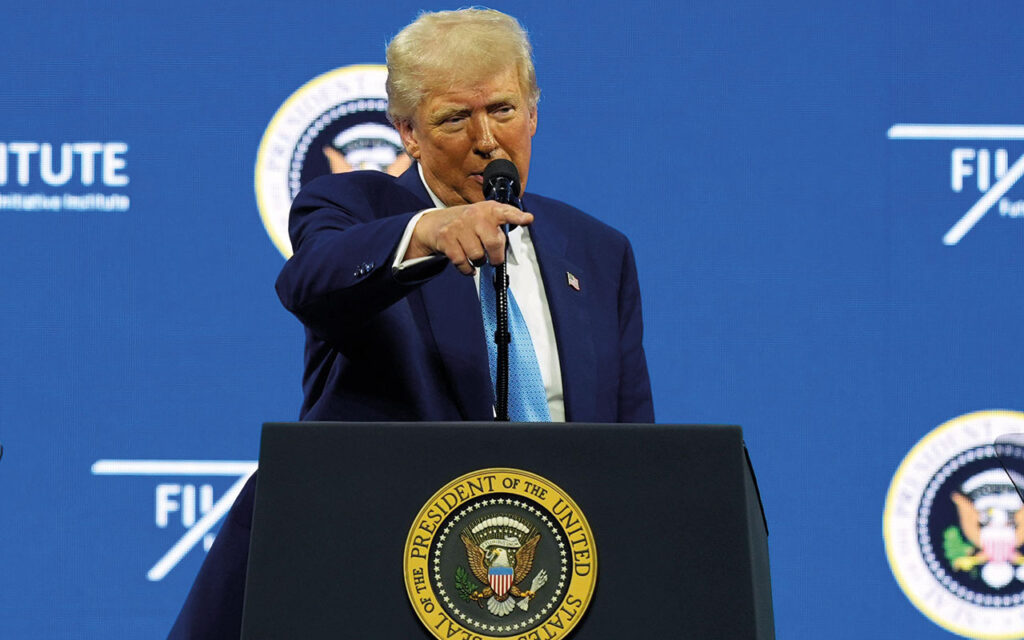The UK pork sector will be directly affected by Donald Trump’s tariffs – but the bigger impact maybe the knock-on effect of the US’s wider global tariff regime on pork trade flows, or even the UK’s efforts to avoid them.
The UK got away relatively lightly in last night’s theatrical announcement – facing the lowest 10% ‘baseline’ rate imposed on all imports to the US.
Some countries, including major pork producers and importers, have been much harder hit. For example, the EU is facing tariffs of 20%, China a whopping 54%, while the president had already imposed tariffs of 25% on Canada and Mexico. Brazil is also on the baseline 10%.
US exports
In 2024, the UK shipped 5,400 tonnes of fresh and frozen pork to the US, worth nearly £19 million. This was 20% lower than the 6,700t, worth nearly £23m, exported in 2023, according to HMRC data summarised by AHDB.
The US is a significant pork destination, having gown in volume in recent years, despite last year’s decline. It is the UK’s second biggest non-EU destination for fresh and frozen pork and fifth biggest overall, but is a long way behind the 41,400t shipped to China in 2024 and the volumes sent to the likes of Ireland, Germany and France.
 The HMRC data records 771t of offal exports to the US in 2024, but no shipments of bacon, sausages or ham.
The HMRC data records 771t of offal exports to the US in 2024, but no shipments of bacon, sausages or ham.
UK pork exports to the US tend to be higher-end products, with a strong focus on British production standards, including antibiotic-free ranges. Sofina Foods is among the biggest suppliers.
The UK has also been looking to exploit the opportunities presented by California’s Proposition 12 legislation that sets welfare standards for pork products produced and sold in the state that only a small proportion of US producers could meet.
It remains to be seen, given the relatively high end pricing of our US pork shipments how big an impact the 10% tariffs will have.
Uncertain global impact
The bigger impact on UK producers could yet be the fallout from how the tariffs, and retaliatory measures put in place by other countries, re-direct trade flows and shape global pork prices.
On the one hand, there could be general inflationary pressures that lift global prices, or new export opportunities where the US or countries exporting to it face new prohibitive tariff barriers.
But there is also the fear of dumping, if some countries are looking for cheap outlets for pork that is no longer competitive elsewhere.
US deal fears
But potentially the biggest impact of all could be the UK’s urgent pursuit of a trade deal with the US that would remove the tariffs, which are, of course, set to have a far bigger impact on some sectors, including the likes of automobiles, pharmaceuticals and iconic UK brands like whisky.
The fear is that to secure any deal with the US, the UK would have to concede a lot of ground when it comes to our current barriers to US food products, preventing imports of, for example, chlorine-washed chicken, hormone-treated beef and potentially pork produced with the feed additive ractopamine. These restrictions are one of the US’s biggest bugbears when it comes to its trading relations with the EU and UK and removal of them is likely to be key to any deal.
UK farmers have long feared this sort of deal could result in floods of cheap imports produced to lower standards.
At a press conference earlier this week, NFU president Tom Bradshaw said any decision to allow imports of chlorinated chicken ‘unacceptable’. He said the UK government must uphold the high production standards of British farmers in any trade deal.
“If we don’t want to produce it here in those methods, then we should not import food produced in that way,” he said, Farmers Weekly reported.
Labour peer and former Defra minister Lord Rooker said importing chlorine-washed chicken would undermine the UK’s food safety standards and introduce potential risks for British consumers.
Industry reaction
Commenting on the Trump tariff announcement, NFU President Tom Bradshaw said: “We have been working closely with the government in the lead up to the announcements. While the UK has been hit by a lower baseline tariff compared to the EU, this remains a challenge for the UK and for agriculture, with the US being our second largest export market beyond the EU.
“While this is a developing and concerning situation, we are working in genuine partnership with the government and sharing our expertise on this to ensure, if there is any market disruption in response to a change in the movement of goods and products between affected countries, we can respond swiftly.
“The US is the largest market for British agri-food products outside of the European Union and our farmers are proud to supply high quality, authentic, and unique British meats and cheeses to American consumers.
“We stand united in our desire to work together to ensure British farmers and growers are at the forefront of any decision-making and will continue to work hand in glove with government as the situation develops.”
Massimiliano Giansanti, president of European farming body, Copa, said: “European farmers and agri-cooperatives are already facing mounting challenges, from rising production costs to climate-related pressures. These new tariffs will add to further uncertainty and financial strain on our sector, affecting both producers and consumers.”
Country Land and Business Association (CLA) vice president Joe Evans said: “Donald Trump might demand we eat chlorinated chicken and beef reared using growth hormones – but British consumers say no. British farmers, who must comply with some of the highest animal welfare and environmental regulations in the world, should not be forced to compete with American farmers who produce cheap food to much lower standards.
“British exports will be affected by these tariffs, which could harm producers of world class wine, spirits, cheeses and other goods. The best thing the public can do to support these farmers and producers is to buy British.”




